Timothy Ferriss's Blog, page 88
March 11, 2016
The Interview Master: Cal Fussman and the Power of Listening
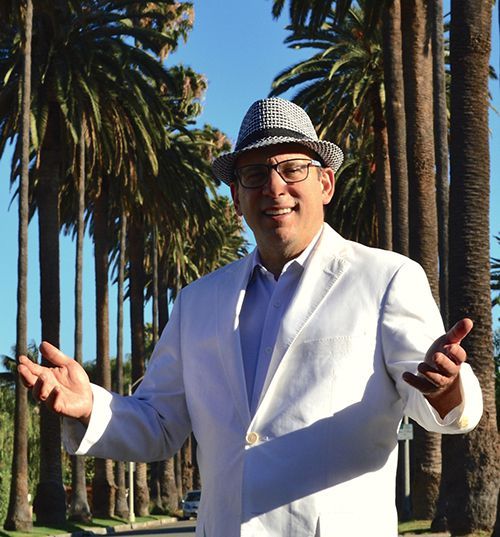
“It took me 10 years to understand that an interview was more than Meet the Press. Then another 20 [years] to figure out that it was more than sitting down with George Clooney and having the time of my life.” – Cal Fussman
This episode is very special to me and features a verbal Jedi who never gets interviewed himself: Cal Fussman.
Cal (@calfussman) is a New York Times bestselling author and a writer-at-large for Esquire Magazine, where he is best known for being a primary writer of the “What I Learned” feature.
The Austin Chronicle has described Cal’s interviewing skills as “peerless.”
He has transformed oral history into an art form, conducting probing interviews with the icons who’ve shaped the last 50 years of world history: Mikhail Gorbachev, Jimmy Carter, Ted Kennedy, Jeff Bezos, Richard Branson, Jack Welch, Robert DeNiro, Clint Eastwood, Al Pacino, George Clooney, Leonardo DiCaprio, Tom Hanks, Bruce Springsteen, Dr. Dre, Quincy Jones, Woody Allen, Barbara Walters, Pelé, Yao Ming, Serena Williams, John Wooden, Muhammad Ali, and countless others.
Born in Brooklyn, Cal spent 10 straight years traveling the world, swimming over 18-foot tiger sharks, rolling around with mountain gorillas in Rwanda, and searching for gold in the Amazon. He has also made himself a guinea pig—Cal has boxed against world champion Julio Cesar Chavez and served as a sommelier atop of the World Trade Center. He now lives with his wife—whom he met while on a quest to discover the world’s most beautiful beach—and his three children in Los Angeles, where he spends every morning eating breakfast with Larry King.
If you only have a couple of minutes, listen to this entertaining segment on what it’s like to do shots with Hunter S. Thompson.
Listen to it on iTunes.
Stream by clicking here.
Download as an MP3 by right-clicking here and choosing “save as.”
Want to hear another podcast from a guest who works behind-the-scenes with some of the world’s most talented people? — Listen to my conversation with Rick Rubin. In this episode, we discuss cultivating world-class artists (Jay Z, Johnny Cash, etc.), losing 100+ pounds, and breaking down the complex (stream below or right-click here to download):
This podcast is brought to you by Audible. I have used Audible for years and I love audio books. I have two to recommend:
The Graveyard Book by Neil Gaiman
Vagabonding by Rolf Potts
All you need to do to get your free 30-day Audible trial is go to Audible.com/Tim. Choose one of the above books, or choose between more than 180,000 audio programs. That could be a book, a newspaper, a magazine, or even a class. It’s that easy. Go to Audible.com/Tim and get started today. Enjoy!
This podcast is also brought to you by Wealthfront. Wealthfront is a massively disruptive (in a good way) set-it-and-forget-it investing service, led by technologists from places like Apple. It has exploded in popularity in the last two years and now has more than $2.5B under management. Why? Because you can get services previously limited to the ultra-wealthy and only pay pennies on the dollar for them, and it’s all through smarter software instead of retail locations and bloated sales teams.
Check out wealthfront.com/tim, take their risk assessment quiz, which only takes 2-5 minutes, and they’ll show you—for free–exactly the portfolio they’d put you in. If you want to just take their advice and do it yourself, you can. Well worth a few minutes to explore: wealthfront.com/tim.
QUESTION(S) OF THE DAY: What can you do this week to make yourself a better listener? Please let me know in the comments.
Scroll below for links and show notes…
Enjoy!
Selected Links from the Episode
The Power Broker by Robert Caro
The Promise of a Pencil by Adam Braun
Read Cal Fussman’s Mikhail Gorbachev interview
Watch George Foreman win the heavyweight championship
One Hundred Years of Solitude by Gabriel Garcia Marquez
Between the World and Me by Ta-Nehisi Coates
Speak Like Churchill, Stand Like Lincoln by James Humes
Cinema Paradiso by Giuseppe Tornatore
Man on Wire by James Marsh
The Walk by Robert Zemeckis
Chimpanzee Politics by Frans de Waal
A Feast of Snakes and Car by Harry Crews
Read Cal Fussman’s piece in Esquire, Drinking at 1,300 Feet
Learn more about Cal Fussman:
Show Notes
Quincy Jones and his unique book signing practice [9:38]
Cal Fussman’s pivotal childhood moment [10:42]
Deconstructing the skill of asking great questions [12:28]
Contrasting interview styles from different life stages [19:53]
The importance of University of Missouri Journalism and its role on Cal’s career [26:08]
What it’s like to do shots with Hunter S. Thompson [30:21]
The story of Cal Fussman’s start in international travel [34:08]
How a single question could get Cal Fussman 6 months of housing and lodging while traveling [51:53]
Common mistakes and lessons learned about the art of asking questions [55:19]
On honing the ability to tell stories [1:05:18]
What happened at the end of Cal Fussman’s travels, which changed his interviewing style [1:09:13]
On speaking at Summit at Sea [1:17:33]
Decoding the art of the interview [1:31:08]
The story of boxing Julio Cesar Chavez [1:41:22]
When you think of the word successful, who is the first person who comes to mind and why? [2:20:18]
What George Foreman did to change Cal [2:29:54]
Most gifted books [2:34:01]
Favorite documentaries and movies [2:41:56]
If you could have a billboard anywhere, what would you put on it and why? [2:48:27]
Advice to Cal’s 30-year-old-self [2:49:08]
The story of the time Cal Fussman had writer’s block, and what Harry Crews said that saved him [2:55:30]
People Mentioned
Quincy Jones
Robert Caro
Muhammad Ali
Hunter S. Thompson
David Halberstam
Ezra Pound
Petra Němcová
Mikhail Gorbachev
Julio César Chávez
Alex Banayan
George Foreman
Michael Moorer
Toni Morrison
Harry Crews

March 4, 2016
How to 10X Your Results, One Tiny Tweak at a Time
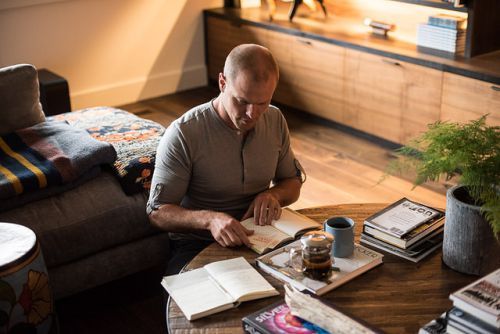
“I think the subtraction can be just as valuable as the addition.” – Tim Ferriss
If you’ve enjoyed my previous in-between episodes, then this might be your favorite episode ever. It’s one of the most actionable, information-packed interviews I’ve ever done.
This time, it’s Joel Stein (@TheJoelStein) asking the questions. Joel is one of the funniest writers I have ever read, and he’s great at leading an interview.
Here’s how it all happened: I have many different conversations with journalists. It can be painful when I have a 1-2 hour conversation, and then it’s cut to a single sentence as a quote in a piece. And it’s often a misquote. So how do you fix that? Well, you record it yourself, which is how this episode was created. (With the interviewer’s approval, of course.) This way, you don’t “lose” the content, and you cover your ass with media and journalists.
Joel wanted me to help him figure out 5 areas he could upgrade in his own life for a series on self-improvement. In this episode, we discuss a wide variety of topics, including:
How I choose what to improve from infinite options
How you can subtract your way to success
The genius of Ben Franklin
Why self-improvement doesn’t mean self-centered
How I say no to time-consuming lunches, coffees, and other meetings
How I tackle cold introductions
How I surmounted Lyme Disease
My 100% complete break from start-ups (read this for more)
My podcast process
Tools and tactics for reversing email overwhelm
Enjoy!
Listen to it on iTunes.
Stream by clicking here.
Download as an MP3 by right-clicking here and choosing “save as.”
Want to hear another podcast packed full of actionable tips that I use in my own life? — Listen to this short episode on the magic of mindfulness. In this episode, I discuss how to complain less, appreciate more, and live a better life (stream below or right-click here to download):
This podcast is brought to you by 99Designs, the world’s largest marketplace of graphic designers. I have used them for years to create some amazing designs. When your business needs a logo, website design, business card, or anything you can imagine, check out 99Designs.
I used them to rapid prototype the cover for The 4-Hour Body, and I’ve also had them help with display advertising and illustrations. If you want a more personalized approach, I recommend their 1-on-1 service. You get original designs from designers around the world. The best part? You provide your feedback, and then you end up with a product that you’re happy with or your money back. Click this link and get a free $99 upgrade. Give it a test run.
This podcast is also brought to you by Thrive Market. If you’re anything like me, you care a lot about the food you put in your body. In fact, I think it’s much more important than exercise. The problem is that good food can be extremely expensive…but it doesn’t have to be.
Thrive Market is like Costco for everything healthy – an online shopping club offering the best brands and groceries at 25-50% off retail prices, shipped nationally for free. There are a lot of Slow-Carb Diet friendly items that I recommend in The 4-Hour Body. You can easily filter everything by your preferences: paleo, gluten-free, vegan, raw, non-GMO, etc. Best of all: each paid membership also sponsors a free membership for a low-income family.
Until December 15th only, you have an opportunity to win $10,000 in top-tier healthy food and other prizes from Thrive Market. Go to this link, and when you enter to win the prizes, you’ll automatically be sent a link to download the Slow-Carb Diet® Cookbook.
QUESTION(S) OF THE DAY: Based on my idea of subtraction, what could you remove from your life that would make you happier and/or more productive? Please share in the comments.
Scroll below for links and show notes…
Selected Links from the Episode
Measure your ketone levels with a Precision Xtra Blood Glucose and Ketone Monitoring System
Project Management Tools:
Slack for eliminating email
Screenflow to record videos to describe my process for doing important things. I upload these videos to a Dropbox folder. When I need someone to execute that process for me, I send them the Dropbox link. That saves me the time of training a new person on each task.
Try out If This Then That automation software
Connect with Joel Stein:
Show Notes
How do you get started in self-improvement? [8:18]
Strategies for saying ‘no’ to time-intensive meetings and/or coffee dates [9:59]
The crux of self-improvement: What gets measured gets managed [12:39]
A technical example of measuring self-improvement [13:45]
A fascinating example of measuring social self-improvement in categories like father, husband, provider, and lover [15:57]
Can self-improvement be selfish? [18:25]
What modern people tend to most focus on improving [21:09]
Money and sex: ideas for measuring and improving [22:06]
Ideas for cutting down on email [22:46]
A framework for decreasing anxiety and tackling psychological issues [25:41]
On doing away with email forever [28:36]
Getting specific on various implementation methods of the 80/20 analysis [31:44]
What I’m working on at the time of this recording: podcast production [33:26]
On the counter-productive nature of amassed tools and real progress [35:40]
On developing assertiveness [36:36]
People Mentioned
Peter Drucker
Benjamin Franklin
Peter Thiel
Robert Scoble
Real-World Blueprint for a $5-Million Week
Ramit Sethi is on the short list of people I respect in the world of finance. In a space saturated by gurus who promote one method of investing and then follow another, Ramit has always been willing to share real numbers. And as a guest on the podcast, he also revealed many of his best successes and experiments.
Ramit built his personal finance blog up to more than 1 million+ readers per month, and has turned it into a revenue generating monster and a growing business with more than 30 employees.
I asked Ramit to dig into the specific details of his most recent success: a $5 million week. Here’s the blueprint he used to make it happen. Enjoy!
Real-World Blueprint for a $5-Million Week
In April 2014, our business generated $5,524,714 over the span of 6 days.
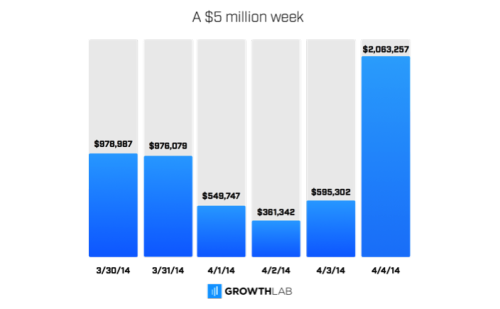
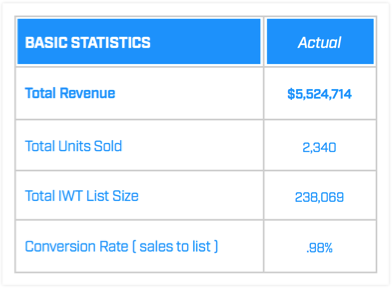
In this post, I’ll show you the launch formula and strategies I used to grow a blog from $0 in revenue to a multi-million-dollar business.
Quick caveat: I had no idea that my blog — which I started from my dorm room in 2004 as a hobby — would ever turn into a “real” business.

The first version of my site was focused on personal finance.
Notice the horrible design and lack of any business model. It was just a hobby!
Along the way, I learned that you can create a business using your own rules.
Tim has already invited other great entrepreneurs to explain how to find your first business idea, how to gather 100,000 emails in a weekend, raise $100,000 on Kickstarter, or even travel the world while building your business.
These are the lessons you won’t learn in any MBA program, but they can be the difference between launching a product that struggles…and one that generates millions of dollars, year after year.
This is the deeper side of business that’s not often talked about. Most of the advice I found when I started my business focused on tools and “hacks,” like A/B tests on headlines…but very little about what happens at higher levels of business. That’s why I decided to write up what I’ve learned.
Since I never expected this to become a real business, I experienced the journey with a blank canvas, in a sense. Everything was new. I didn’t know what I was “supposed” to do, so I tried it all. Over 11 years, we made some unconventional decisions in our business. Some were big mistakes. Others paid off.
Now let me show you how we got to a $5 million week.
* * *
“It’s Not Magic, it’s Math”
I used to look at other entrepreneurs who seemed to intuitively “know” what products to create, how much to charge, etc. Years later, I learned they actually used sophisticated models to help them make decisions. (Weird how they failed to mention that.)
Over time, I learned that it’s not magic — it’s math.
Let me show you a simple version of these models, which can help you understand where to spend your time and where to not waste it.
Take a look at what it takes to generate $1 million over five years:
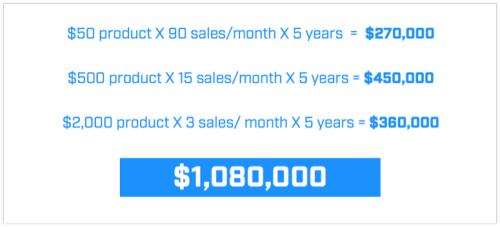
Let’s ignore what the product actually is. We can figure that out later. For now, just focus on the numbers.
Here are a few things to notice and consider:
Isn’t it surprising how you can sell 30x more of the $50 product, but the $2,000 product still generates more revenue? (Of course, it’s much harder to sell a $2,000 product than a $50 product.)
These estimates are conservative: I chose 15 sales/month because anybody can achieve that with a little bit of work. I chose 5 years because — who knows? — maybe you’ll decide to move on and do something else. I like to be conservative in my projections.
QUESTION: Based on what you just read, would you create a $50 product or a $2,000 product? (Hint: There are successful businesses at either price point. Each has trade-offs. For instance, you could create a $50 product in a month or two, offer it for sale, and get market feedback FAST. A $2,000 product will take considerably longer — months, if not years. But the long-term rewards can be worth millions.)
Now here’s how we might get to $5 million:
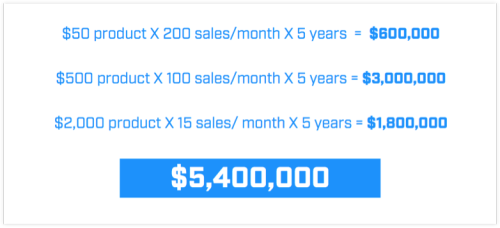
Things to note:
Here, we have the exact same 3 products, but a higher number of sales. If you want more sales, there are two primary ways to do it: more traffic or higher conversions. Simple and straightforward.
If someone buys from you once and likes what they get, they are far more likely to buy again. In our own analysis, a customer is 2,300% more likely to buy from us than a non-customer.
QUESTION: Should you optimize for more customers or more revenue? Based on the numbers above, if you had to choose, what would you do? For instance, with a lower-priced product, you’ll need a lot of customers to make substantial revenue (the “McDonald’s model”). Alternatively, you could sell a higher-price product and profit from fewer customers — but those take longer to build and test (the “Rolls Royce model”).
Now let’s get even more sophisticated: Let’s say we wake up and realize that selling a $50 product is a lot of work for a small return, so we decide to add a subscription product.
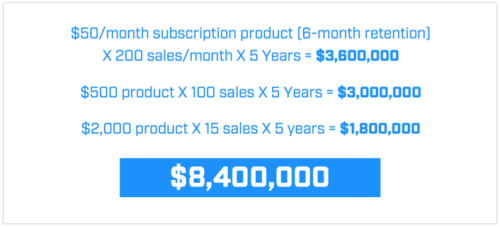
This is starting to get really interesting.
Subscription revenue is considered “high-quality” revenue since it’s recurring. In other words, it really adds up, which is why businesses like Netflix are so amazing.
QUESTION: Can you spot which factors we’re leaving out to keep the model simple? (For example, retention, refund rates, cost of marketing, taxes…) That’s intentional. If this simplified model shows that you can’t realistically make a profit, none of that stuff matters. You only need to pay attention to these details if the model says the opportunity is worth pursuing.
What do you take away from the 3 examples above?
For me, seeing these numbers raised a lot of questions. Can an entrepreneur really survive selling a $5 or even $20 product? If you’re Procter & Gamble, sure. If you’re Alex The New Entrepreneur, that’s going to be tough. (Especially since low-price customers are lower quality, ask for refunds more often, and often make your life a living hell.)
Now let’s go one level deeper. Instead of just asking ourselves how many sales we need to make, we wanted to “stress test” our idea to see if it’s even realistic:
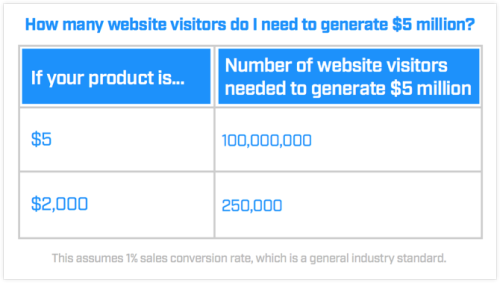
I don’t know about you, but I have no damn clue how to get 100,000,000 to visit my website. But I knew I could find a way to get 250,000 to find me.
By the way, this isn’t all-or-nothing. If you can’t find 250,000 visitors, you can start with 50,000 or even 5,000.
Let’s say instead of 250,000 visitors (which takes a lot of time to get) you have just 1,000 email subscribers. Also, instead of creating a $2,000 product (also tough when you’re starting out) you build a $250 product.
Using the same math above — a 1% conversion rate — you could earn $2,500 per month from just those 1,000 people.
Kevin Kelly calls this the 1,000 True Fans approach, where even 1,000 true fans can fund you for life:
A creator, such as an artist, musician, photographer, craftsperson, performer, animator, designer, videomaker, or author – in other words, anyone producing works of art – needs to acquire only 1,000 True Fans to make a living.
This is pretty amazing if you want to create something with impact. It means you don’t always need venture capital fundraising. It also means that 1,000 “true” fans are worth more than 100,000 vaguely interested readers.
We actually have data to support the “1,000 True Fans” idea. Take a look at the difference between a dedicated group of “true” fans vs. a larger group of onlookers.
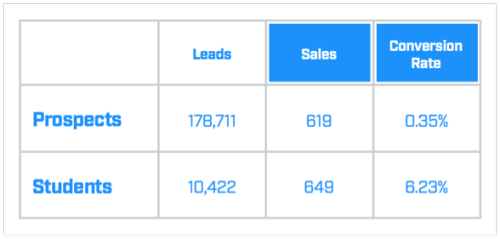
Here, we got virtually identical sales from a small group of 10,422 customers vs. a larger group of 178,111 subscribers
We got more sales from a much smaller, focused list than a huge list of 178,711 subscribers! You don’t need everyone — you just need the right people.
Unlike building an audience of 250,000, you can get 1,000 true fans from a single guest post. On Tim’s podcast, we talked about how one blog post can be “life-changing”(skip to 23:35).
And just like you don’t need 250,000 people on day one, you don’t need all 1,000 True Fans on day one. If I were starting from scratch today, here’s how I’d frame it:
“Yes, 1,000 fans would be amazing, but I can start with 1 fan. And if I can get 1 fan, I know I can get 10 fans. Then 100. And once I have 100, I know I’m onto something.”
Nobody builds a massive audience overnight. I wish I could go back in time and shake myself to stop comparing myself to people who’d been in business for years and years. Trust your models, put in the work, and your business will grow.
I used these simple models that told me some basic things:
How much could a $50 product generate vs. a $2,000 one
You don’t need $10 million in venture capital to start a business
In the beginning, you just need a few fans who love you instead of aiming for tons of people.
Were these models perfect? No. Later, when my business grew, I showed these models to more sophisticated entrepreneurs. They laughed.
But you don’t always need the fanciest tools to grow. These models were good enough to take me from idea, to launch, to sales. Leave perfection to losers. “Good enough” is the motto of every entrepreneur who lives to fight another day.
Once I started generating a little revenue, I noticed something I wouldn’t have expected.
The World Wants You to be Vanilla
Have you ever noticed how the minute you start trying something new, the entire damn world tells you what you should do?
This happened when my business started growing:
“Ramit, you really need to get on Facebook”
“LOL $99? Maybe I’d buy it if were $0.25 and had a 30-year-guarantee” (I hate these people)
“So you’re just one of those scammy ebook guys who writes those long sales pages?”
If you’re ever tried to change your diet, you know what happens: Your boss, your aunt, and your garbage man all start giving you their advice.
I got this a lot. People would laugh at the name of my book (Tim and I both joke that we have the scammiest sounding book titles of all time). They told me my headshot sucked. And they had all kinds of tips for places I needed to advertise, including buying random people McDonald’s meals and talking to them about personal finance. Never ask the general public for marketing advice.
Here’s an unexpected lesson I learned: The world wants you to be vanilla. They want you to be the same as everyone else. But the minute you are, they abandon you.
They’ll try to get you to charge less. They’ll critique your design. But as soon as you conform…you look like everyone else. And in a world full of websites and ebooks and apps, if you look like everyone else, you’re dead.
When I started growing business, I realized something: I could choose. This was MY business. I didn’t have to follow someone else’s formula to be successful.
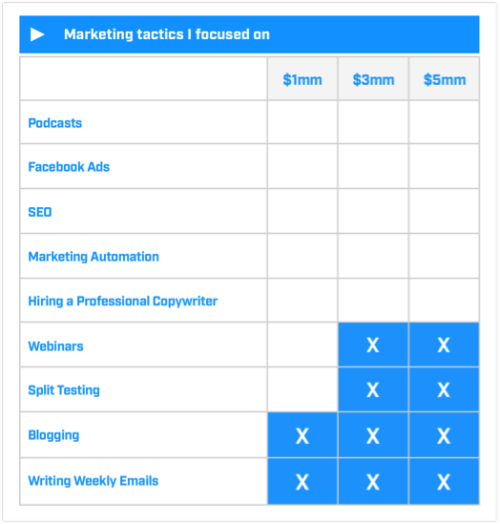
This chart should surprise you — not at all the things we did, but at all the things we chose not to do. If you listen to the advice of internet pundits, they’ll tell you how you “need to” use podcasts, SEO, SEM, marketing automation, email marketing, webinars, and on and on. Ignore them. The worst thing in the world is to be mediocre at 15 different platforms.
We’re very selective about what we pursue and when. For example, it makes no sense to split test until you have enough traffic for statistically significant results.
Sometimes the stakes are even higher. Here’s a type of marketing funnel that’s been effective for us:
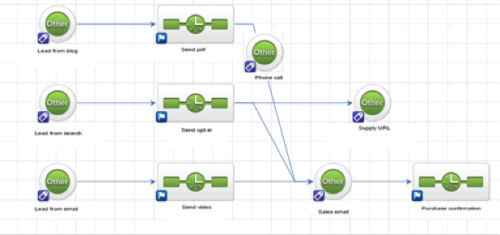
You see a lot of people on the internet trying to launch on day 1 with funnels like this. The truth is not so simple.
When I was in 4th grade, they separated the boys and girls into separate rooms and taught us a sex-ed class. I’ll never forget my teacher, Mr. Binning, giving us a serious warning:
“Guys, avoid shaving for as long as possible. Once you start, you can never stop.”
I think about his advice a lot. For instance, we used to use Aweber, a simple email service provider. As we grew, we kept hearing people tell us we “needed” to switch to a more sophisticated platform. The world wants you to be vanilla — why don’t you buy a new car? Why don’t you upgrade your software? Come on, dude.
I resisted for years because I knew that once we switched, we’d need more and more staff to support it. Finally, after we were bulging at the seams with over 150,000 subscribers, we switched to a more sophisticated email platform. Now I don’t even know how to send an email! We have an entire staff dedicated just to running the new platform! Be careful of when you choose to upgrade — you can never go back down.
“Get a real marketing automation platform. Run Facebook ads! You definitely need SEO.”
The world wants you to be vanilla.
Another example: there’s a great sushi restaurant in San Francisco where it’s almost impossible to get reservations. If you try to walk in after 7:30pm, sorry — you’re out of luck. When I finally got inside, like a true weirdo, the first thing I did was start analyzing how much revenue they were leaving on the table.
I’m sure they could generate 25% more revenue by squeezing more tables in. But they just don’t care. They run their business the way they want to, and they have a line out the door every day. That attitude inspires me — to be able to run my business the way I want, and to be able to choose the customers I want to work with. To sacrifice short-term revenue to create a business I am proud of.
Most entrepreneurs don’t explicitly decide what kind of business they want to run. I’m challenging you to think about it. Do you want a business like McDonald’s or Louis Vuitton? There are no wrong answers, but your decision will have profound effects as you go from $10,000 a year, to $10,000 a month, to $10,000 a day, and even $2 million in one day, as we did on 4/4/14.
Just think about the way Louis Vuitton sells its items. How do you expect to be treated when you walk into their store? How much merchandise is on the shelves? How is it displayed? What does the staff member look like? How do they treat you?
Now compare that to McDonald’s or Home Depot. Totally different. Not better or worse. Different. Different prices, brands, scalability, etc.
How to Draw the Line in Your Business
Years ago, we made a decision not to play in the $50 sandbox. I’d rather give away 98% of my material for free and charge premium prices for top-tier material for elite students. Once you make a decision to play at the top of the market, that narrows your audience, the channels you use, and your marketing strategies. That’s exactly what you want to do — make a decision, then focus.
For example, here are a few decisions we made that makes us starkly different from most businesses in our space:
We spend millions of dollars testing, refining, and perfecting our products before they ever see the light of day.
We make it difficult to join our courses and actively encourage people not to join. We consider student selection a strategic decision
We send long, meaty emails — even though the “experts” say you should get straight to the point because “nobody has time anymore”
You can do some of this, all of this, or none of this. The point is that it’s up to you.
We chose to operate in a premium market. Now let me show you how selling works at the $2,000+ level.
Sales Strategies to Generate $5 million+ in 6 Days
Selling a $2,000 product is nothing like selling a $100 product. Think how the Four Seasons is marketed vs. Holiday Inn.
By the way, I keep reading posts where nutcases (usually Silicon Valley engineers) rant about enterprise software businesses that don’t show the prices on their website. “What a waste of time,” they say, “I would never buy from this site.” They are right. They are not the customer. Instead of trying to understand the real business model, they dismiss the companies as stupid.
These companies are not dumb. They just know their customer, and it’s not the person who wants to comparison shop on price.
Here’s an example of how we sell one of our flagship courses, Zero To Launch, a course on creating your own online business:
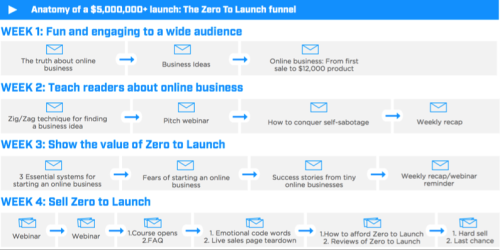
Actual $5 million email funnel from IWT
This is the sales funnel for the product, consisting of emails, blog posts, and webinars. Certain marketing elements are obvious, but others are not.
First, we aren’t reinventing the wheel in places we don’t have to. Just like Tim wrote in The 4-Hour Workweek, “I don’t walk down the street on my hands just because everyone else walks on their feet.”
Similarly, much of the structure of this sales funnel is quite standard:
We sent 3-5 emails per week (ignore people who say that’s emailing too much — people actually love getting emails as long as they’re good)
We did a webinar to introduce our sales week
We used case studies and money-back guarantee elements to provide “risk reversal”
We also used a variety of tools to power the launch:
Email Delivery: Infusionsoft & Maropost
A/B Testing: Visual Website Optimizer & KISSmetrics
Webinar Hosting: Ustream
Landing Page Platform: Leadpages
Live Chat: ZopIM
Customer Support: Zendesk
So far, none of this is out of the ordinary. Many entrepreneurs have used the exact strategies and tools above to generate a 6-figure launch. But I didn’t want the typical 6-figure launch.
It turns out that the real decisions that drove $5 million in sales were not the tools I used nor the pricing tier we chose. In fact, many of the most important decisions contradict the “rules” we’ve all been taught.
The real decisions that drove $5 million in sales were made years before we ever launched this product.
$5 Million Lesson #1: We’re Selective About Who We Serve
We’ve all heard about “niching it down,” or choosing your customer. When I learned more about that sushi restaurant in San Francisco, I started to admire how they lived and breathed this.
If you weren’t there early enough, sorry. If you asked for substitutions, you should probably try another place down the street. Of course, they had to have the best sushi to set these rules, which made their restaurant even more interesting to me.
Over time, we’ve learned to be very selective about who we allow to join us. Notice we use the word “allow” — not to be arrogant, but because we spend millions of dollars developing and testing our material, we consider it a privilege to allow someone to join.
That means we don’t allow anyone with credit card debt to join our flagship programs, a decision that costs us more than $2 million dollars per year. We use the carrot-and-stick approach:
The carrot: If you’re in credit card debt, we don’t want your money until you’re financially comfortable. We believe you should be focused on paying your debt off, not joining a $2,000+ course. So we send them a free copy of my book chapter on paying off debt and tell them to email us when they’re debt-free. We’ll be here to welcome them in.
The stick: We also tell them that if they join with credit card debt, we’ll refund their money and ban them for life. We take this seriously and maintain a “DNS” — Do Not Sell — list.
We also make it intentionally difficult to join our courses. One of the first things you’ll notice when you visit GrowthLab is that you cannot buy anything from it. We strategically and intentionally only allow you to buy from our email list, so we can first build a relationship and show you how our material is different.
And even then, courses only open for a few select windows throughout the year, then close days later. They remain closed for months or even years.
We’re looking for decisive students who are ready to take action. (When students miss a deadline, we get predictable requests to let them in. We always say no.)
Perhaps, it would be easier to simply post a list of our products with a link to buy, and if our courses were $100, we would take a very different approach. But that’s not the customer we want, just as a high-end handbag store does not run 70%-off sales.
In fact, we have actual data showing the difference in quality between prospects (non-buyers) vs. students (buyers). Remember how we generated 649 sales from 10,422 people — and just 619 sales from over 15x as many people?
Tim often writes about 80/20 analysis. When you focus on your true customers — the ones who are ready to take action, the ones for whom price is a mere triviality — you can counterintuitively spend more time and more money serving them.
This is why every single student who joins one of our courses receives a live phone call from a trained representative.
It’s why we continue to send high-quality material and free updates years after they’ve joined a course.
And it’s why we’re able to extend 12-month payment plans when our competition typically only offers up to 3 months.
How to Find Your Rabid Fans
I’m going to show you the first step to attracting diehard, lifelong fans who buy from you and tell their friends.
First, just for fun, let’s assume you’re creating a product about careers. Right off the bat, we can answer some important questions:
Who are you targeting? Based on what we covered today, do you want to target (1) college students who have never had a job, (2) unemployed people, or (3) people who already have jobs but want to make a change? You could choose any option, but let’s pick #3, people who already have jobs but want to change.
What’s going through the mind of people who want to change their careers? If you went to the bar with a friend, what actual words would he use to describe it? Maybe it’s “I don’t want to be chained to this desk for the next 40 years.”
Why haven’t these people already taken action? Do they say things like “I know I need to network, but I’m an introvert and I hate selling myself?”
Here’s a tool to get even more specific about who your customer really is:
This is called a Customer Desire Map. Here, you write down the pains and fears, hopes and dreams, barriers and uncertainties of your best customer. This tool has helped us nail down the positioning for million-dollar product launches in multiple industries.
Now you try it: Pretend you’re building a fitness product. Using the same format above, paint the perfect customer for a fitness product using the same phrases they would.
For instance, your map might include phrases like this:
“I try so hard, and nothing works.”
“I need more energy.”
“You want me to eat less bread? No way.”
By the time you build your Customer Desire Map, you will know who your most likely rabid fans are. You would recognize this person if you met them in a bar. And when you sit down to build your product, write your copy, or publish guest posts, you’ll be 100% clear on who you’re speaking to.
$5 Million Lesson #2: The “Students For Life” Philosophy
For 8 years, we’ve sent 3-5 emails per week, plus blog posts, plus videos — all free.
My goal is to create free material that’s better than anyone else’s paid stuff. And when a reader uses my free material to negotiate a $28,000 raise, they instantly become a student for life.
At that point, price is practically a triviality.
One of the primary reasons we can sell products that are 10x – 100x the price of our competition is that we get them results before they even have the chance to buy. That’s because 98% of our material is free. In fact, if you look at the sales funnel above, you’ll notice that the first two weeks are focused on getting our students successful results — whether or not they pay us a cent.
We believe that as long as we continue producing the best material — free and paid — it’s just a matter of time until they join us. With that long time perspective, you can do some really cool things.
You can invest in them first by sending them free PDFs, detailed videos, and even host meetups around the world because you know when you invest in your prospects first, eventually they’ll invest in themselves. It could be with you or with someone else, but if your material is the best, they’ll eventually come to you.
You can get more personalized. I get 2,000+ emails per day and read every single one.
If someone emails asking whether a course is right for them or not, we’re completely candid and often direct them to a competitor product. We know the power of trust you build when you’re honest with a prospect, especially when it goes against your best interest. In the short term, it might cost us $2,000 or $5,000. In the long term, it’s priceless. This is based off of my mentor Jay Abraham’s strategy of preeminence.
In short: While others focus on sales-page optimization, by the time we make our sales page live (“open” it), we aim for the sale to be a foregone conclusion.
Here are some specific suggestions for creating fans for life:
In your emails and blog posts, aim for a ratio of at least 80% meat (valuable content with no selling whatsoever) and 20% pitch (sales material).
Prove how good your material is first — for free. There are millions of other sites out there. Why would anyone listen to you? Prove it, using great content, success stories, and even personal interaction using email and chat. You’ll instantly stand out.
Employ the Damaging Admission. If someone wants to buy your product, but you know it’s the wrong fit, be honest. You’ll give up short-term revenue, but they’ll respect you, tell their friends, and someone will be 10x more likely to buy when the time is right.
$5 Million Lesson #3: The CEO Sets the Strategy, Not the A/B Test
We once ran a low vs. high price test. According to the test, we would maximize revenue if we charged the lower price. I reviewed the data and thought about it. Deciding on the low price would instantly generate hundreds of thousands of dollars of revenue.
As an entrepreneur, some of the most challenging decisions are those where lots of money is staring you in the face. But I don’t think business is always just about money. Ultimately, I decided against the lower price because it would attract the wrong kind of customer (and headaches).
Tests are terrific. Data is critical. But the CEO ultimately sets the vision and makes the call.
Don’t get me wrong: testing is a huge component of my business. For example, we ran a successful test to optimize our email subscribers that generated $87,000 for us.
Can you guess which variant was the winner?
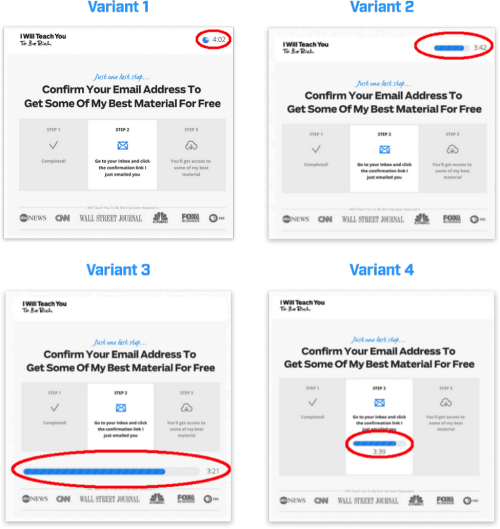
The winner was variant 3. This one test produced a sizeable increase in email subscribers, which is worth over $87,000 annually to our business.
You see lots of winning split tests on the Internet. They’re fun to brag about. But almost nobody will tell you two things:
How much revenue their test generated. It sounds impressive to say you got a “50% lift in email subscribers,” but if that doesn’t generate actual money for the business, who cares?
The shameful secret of the testing industry is that most tests produce 0 winners!
At IWT, between 70%-80% of our tests do not move the needle in any way. And we’re good at what we do! Would you be comfortable doing something and knowing that 70% of the time, it would fail?
The key is the strategy of being methodical, not any one test. It’s like writing a book — your table of contents matters more than any individual page.
When you understand that failure is part of the process, you just keep going. A few years ago, I was sure my readers wanted a product on healthcare. After all, I’m an educated guy and I couldn’t figure out how to choose my health insurance!
We spent over $50,000 building a product, beta testing it with students, even writing copy for a launch.
We locked this healthcare product away in our vault and it will never be sold to the public.
Because after all that testing, we realized this product was going to be a complete failure. It turns out people love to complain about healthcare…but few want to really do anything about it.
This was a very expensive lesson for us. It taught us to become much more rigorous around testing. Our goal is to virtually guarantee success before we ever launch something.
Of course, sometimes your gut choices backfire.
I once decided we needed to switch email service providers. We hired someone to help us lead the evaluation process, which took more than 3 months. We finally conducted the due diligence, legal and engineering checks, and signed the $100,000 contract. The next week, when my team logged in, they realized — to their horror — that the software couldn’t perform a simple function that was critical for us to use the software. Their engineering team wouldn’t promise when they’d build this feature in the future, so we were stuck. My team asked me what we should do.
By this point, we’d already paid them $30,000. I gave them a call and said, “Look guys, I’d appreciate your help on this. We made a mistake. We’ve already paid you $30,000 even though we haven’t imported a single piece of data. Honestly, you should keep that money. But I’d personally appreciate it if you could cancel the rest of our contract so we don’t have to pay $70,000 for software we don’t use.”
Their response:
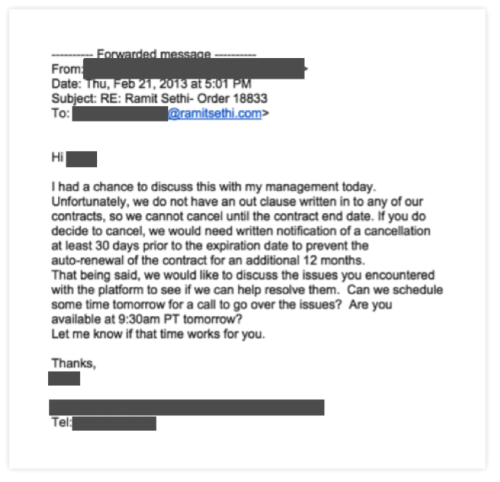
Translation: We feel sorry for you, but we’re still collecting your $100,000.
I can’t really blame them. After all, it was my fault for not overseeing the project. I fired the team member, swallowed the $100,000 cost, and set systems in place so we’d never make the same mistake again. Sometimes your gut leads you the wrong way.
Still, if we were to base every decision on what test data showed us, we’d soon look like every other site — with loud, shrieking claims, blinking headers, and page-long testimonials. I’d rather be dead.
We do use rigorous testing methodology. In fact, we’re running more than 20 tests at any given time. But we always balance science with art.
Let me show you what I mean. There are two kinds of posts that gets tons of likes on Instagram: food pics and inspirational quotes. I love nachos as much as anyone, but I’ll be damned if my Instagram is going to turn into a food-review account.
Yet if we follow the raw data, that’s what many businesses become: a test-driven Frankenmonster built to appeal to the lowest common denominator. They chase the empty click, the easy “like.”
It’s tempting to post something that you know will get 500 likes tomorrow. And sometimes, you really want to post an inspirational quote. Great! Do it!
But the pursuit of a cheap click at the expense of all other standards is the beginning of the end for a business. Every time we’ve insisted on quality, it’s paid off. And every time we’ve tried to take a shortcut, we’ve paid dearly.
To make sure you can set strategy, here are a few important considerations.
How to Find Time
The first thing I learned was to be intentional. I wasn’t going “find” time unless I made it. So I started by clearing one hour per week for big-picture thinking. Eventually, I blocked off an entire day.
It’s on the calendar so my team knows:

“Strategy Wednesdays” on my calendar. DND = Do Not Disturb
At first, it feels weird to block off this time without any clear-cut purpose. Do it anyway. I found several million-dollar breakthroughs on my strategy days and they’ve become a catalyst for my business.
Once you have time, it’s important to read the right material
Personally, I like to read books from people I admire. Here are five books I suggest you start with:
The Checklist Manifesto: How to Get Things Right by Atul Gawande
Mindless Eating: Why We Eat More Than We Think by Brian Wansink
The Robert Collier Letter Book by Robert Collier
Age of Propaganda: The Everyday Use and Abuse of Persuasion by Anthony Pratkanis and Elliot Aronson
Iacocca: An Autobiography by Lee Iacocca and William Novak
Good ideas can shape your mindset and strategy. So, making time to read is inevitably a part of building a better business.
The True $5 Million Lesson
I thought that as I grew my business, I’d learn about the super-secret tools that successful entrepreneurs used once they crossed $1 million, $5 million, and beyond.
But actually, I learned two very different lessons:
My first lesson was that business isn’t just about creating money. Of course, you need to get paying customers. And when you launch, you should be fiercely focused on building an audience of people who love what you’re doing (and are delighted to pay). Ultimately, every successful entrepreneur I know looks for more meaning than another $100 of revenue. For me, it’s about impact and generosity.
My second lesson was that you can create a business your way.
There will always be people who criticize you for charging too much. Let them complain. They’re not buyers.
There will be people who tell you that you “need to” set up a Facebook page, or Twitter account, or Instagram. I didn’t have those for years. And even if you took all my social media accounts away today, it would make zero difference to my business.
There are even people who think that online courses are a total scam! Nothing I say will change their mind. I love getting their hate mail, though.
And don’t always be different, especially conspiciously. I once had a friend tell me he wanted to charge $62, an unusual price, for his product. “Why?” I asked. “I just want to try something new.” My friend was being an idiot. There’s no need to reinvent the wheel: Most things in business are remarkably similar. You need a website, an email list, a sales page, and a product. Get those basic things right, and you will grow. You don’t need to reinvent the wheel on everything.
The most successful entrepreneurs — the top 1% of the top 1% — learn when to break the rules. It’s like when you learn how to dress well and you start experimenting with patterns and textures because you want to. One day, someone’s going to say, “Dude, that doesn’t even match,” and you’ll say, “So?”
It’s the same with your business. Know the best practices, execute them, but as Marshall Goldsmith says, “what got you here won’t get you there.” Your greatest successes won’t come from imitating best practices. Your competitors are almost certainly following a me-too playbook.
We were fortunate to generate $5 million in 6 days. Sure, the tools helped. Yes, the headlines mattered. But ironically, when we stopped chasing revenue and instead shifted to impact and students for life, that’s when we grew faster than ever before.
Ramit Sethi is the New York Times best-selling author of I Will Teach You To Be Rich. He writes for over 1 million readers/month on business, careers, negotiation, and psychology. If you’re interested in launching an online business, get our exact, word-for-word funnel that generated $400,000: GrowthLab.com/400k

March 2, 2016
The World’s Most Famous Performance-Enhancement Chemist
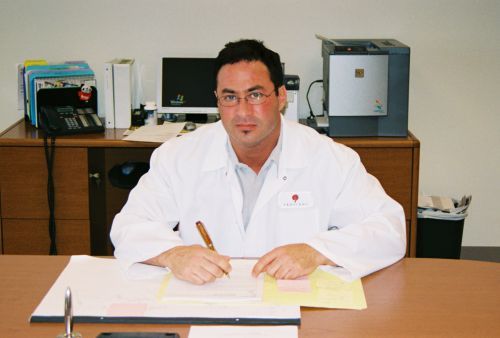
“The thing about the government is that they can accuse you of something, ruin your life, you can be completely innocent and you don’t get compensated.” – Patrick Arnold
At the behest of my astute legal counsel, here is a legal disclaimer for this episode:
First, I am not recommending, endorsing, or supporting any of the substances or compounds (especially illegal) discussed or described in the interview. I am interviewing Patrick Arnold as a journalist seeking additional information regarding matters of public interest and concern.
Second, I have removed some of the names of athletes who are alleged to have used performance enhancing drugs. I recognize that this seems excessive, but even if athletes have been publicly banned for drug usage, unless the ban relates to the specific substance and time period referenced in the podcast, I can be sued for defamation for repeating or publicizing these stories.
With all that said, here we go…
If you liked my episode with Dom D’Agostino, Ph.D., you might love this one.
Patrick Arnold, widely considered “the father of prohormones,” is an organic chemist known for introducing androstenedione (remember Mark McGwire?), 1-Androstenediol (marketed as “1-AD”), and methylhexanamine into the dietary supplement market.
He also created the designer steroid tetrahydrogestrinone, best known as THG and “the clear.” THG, along with two other anabolic steroids that Patrick manufactured (best known: norboletone), were not banned at the time of their creation. They were hard-to-detect drugs at the heart of the BALCO professional sports doping scandal, which thrust Barry Bonds and others into the spotlight. BALCO distributed these worldwide to world-class athletes in a wide variety of sports, ranging from track and field to professional baseball and football.
Recently, Patrick has been innovating in the legal world of ketone supplementation, including breakthroughs in performance and taste with products like KetoForce and KetoCaNa, which were highlighted during my podcast with Dominic D’Agostino, Ph.D.
If you’d like to meet the (in)famous Patrick Arnold in person, you can find him at The Arnold Classic in Columbus, Ohio from March 3-6, 2016 at Booth 328.
Otherwise, you can check out his current concoctions for athletes here and here.
In this science-dense conversation, we cover a ton, mostly related to better performance through chemistry. We also discuss Patrick’s biggest successes and mistakes, his path to science, ursolic acid and other clever creations, exogenous ketone supplementation for sports, as well as nonsense in the media about anabolics (e.g., current Delta-2 scandal).
Short on time? Listen to this segment on how an internet chat forum led to one of the biggest scandals in sports history.
Listen to it on iTunes.
Stream by clicking here.
Download as an MP3 by right-clicking here and choosing “save as.”
Want to hear another podcast related to enhanced human performance from another chemist? — Listen to my conversation with Dom D’Agostino, Ph.D. In this episode, we discuss fasting, ketosis, and the end of cancer (stream below or right-click here to download):
QUESTION(S) OF THE DAY: What is your philosophy on the use of performance enhancing chemicals? Please let me know in the comments.
Scroll below for links and show notes…
Selected Links from the Episode
Learn more about gynecomastia (AKA – bitch tits)
Check out the Arnold Classic
Check out FitCon
Learn more about 6-OXO
Learn more about tetrahydrogestrinone (THG)
Check out the Merck Index, a compilation of natural compounds
Watch the documentary Bigger Stronger Faster
My ketone measurement tool – Precision Xtra Blood Glucose and Ketone Monitoring System
Breathalyzer ketone measurement tool – The Ketonix Device
Check out KetoCaNa, Prototype Nutrition’s exogenous ketone product
Learn more about Ian Danney (Note: Danney-Ball), Optimum EFX and Amino Matrix
Learn more about Metformin
Jack Kennedy by Chris Matthews
Guns, Germs, and Steel by Jared Diamond
To purchase Patrick Arnold products visit:
Prototype Nutrition (Facebook) | E-Pharm (Facebook)
Learn more from Patrick Arnold:
KetoSports.com (Facebook) | PatrickArnoldBlog.com
Show Notes
How Patrick Arnold developed a passion for bodybuilding, chemistry, and anabolic steroids [5:12]
How Patrick started making his own chemical concoctions [9:31]
How Patrick decided to create designer steroids [13:31]
Patrick’s concept of prohormones [17:57]
Describing the progression from androstenediol to 4-androstenediol (4-AD) to 1-androstenediol (1-AD) [22:07]
Elaborating on Patrick’s “learning experience” with methadone derivatives [29:57]
How Patrick weaned himself off methadone [34:42]
Other athletic enhancement drugs, which have high abuse potential [39:12]
The biggest waste of money for athletes and competitors in terms of supplements [44:49]
The compounds Patrick created that he is most proud of [47:45]
The story of when DEA came after Patrick Arnold’s company [55:12]
How Patrick came in contact with Victor Conte [58:32]
Distinguishing between anabolic and androgenic steroids [1:10:05]
How tetrahydrogestrinone (THG) came about and why it was so weird [1:16:39]
Drugs that should not be used with anabolic agents [1:22:56]
What is ursolic acid and when will it become available again? [1:25:42]
If IGF-1 production is increased from ursolic acid products, at what point is cancer risk elevated? [1:32:31]
Thoughts on quickly learning rudimentary organic chemistry [1:33:57]
Patrick’s yohimbe experiment [1:36:21]
When will we be able to measure our own BHB levels without blood? [1:40:41]
How Patrick was introduced to the world of exogenous ketones [1:45:07]
What are the most interesting applications of exogenous ketones? [1:51:27]
Who should be wary of consuming exogenous ketones or KetoCaNa [1:55:37]
Personal attributes that have been important to his success with making new chemicals [1:56:47]
When do the best ideas come to you? [1:59:05]
Typical morning routines [2:00:12]
Patrick Arnold’s workout drink and routine [2:01:12]
Thoughts on longevity and expanding lifespan [2:03:37]
When you think of the word successful, who is the first person who comes to mind and why? [2:05:58]
Most gifted books [2:06:50]
The most common misconceptions about Patrick Arnold [2:08:12]
Advice for your thirty-year-old self [2:10:30]
Patrick Arnold’s comments on Delta-2 [2:12:37]
Performance enhancing drugs and therapies which we will be hearing about in the next few years [2:16:52]
Thoughts on selective androgen receptor modulators (SARMS) [2:19:31]
Particular molecules that are exceptionally beautiful [2:23:44]
People Mentioned
Dan Duchaine
Victor Conte
Don Catlin
Bill Gates
February 28, 2016
How to Achieve Self-Ownership
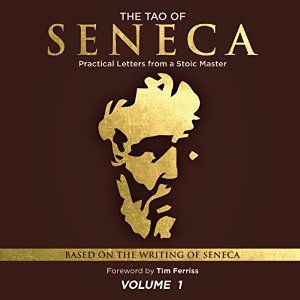 “Greatness develops only at long intervals.” – Seneca
“Greatness develops only at long intervals.” – Seneca
This is another special episode of the podcast, featuring one of my favorite letters from Seneca. It’s not long, but its impact is far greater than the duration. Before you listen, I want you to think about this philosophy from Fight Club:
“The things you own end up owning you.”
Understanding this mindset will help you to explore the practical philosophies found in this episode. Please enjoy Letter 42, On Values, by Seneca the Younger.
If you only have 60 seconds, listening to this clip could increase your happiness by changing your relationship with your possessions.
If you find this letter useful, you can pick up the whole collection at the Tao of Seneca.
Enjoy!
Listen to it on iTunes.
Stream by clicking here.
Download as an MP3 by right-clicking here and choosing “save as.”
Want to hear another segment of The Tao of Seneca? — Listen to How to Practice Poverty and Reduce Fear. In this episode, I dig deeper into the value of stoicism and examining unfounded fears and untested assumptions (stream below or right-click here to download):
This podcast is brought to you by 99Designs, the world’s largest marketplace of graphic designers. I have used them for years to create some amazing designs. When your business needs a logo, website design, business card, or anything you can imagine, check out 99Designs.
I used them to rapid prototype the cover for The 4-Hour Body, and I’ve also had them help with display advertising and illustrations. If you want a more personalized approach, I recommend their 1-on-1 service. You get original designs from designers around the world. The best part? You provide your feedback, and then you end up with a product that you’re happy with or your money back. Click this link and get a free $99 upgrade. Give it a test run.
This podcast is also brought to you by Wealthfront. Wealthfront is a massively disruptive (in a good way) set-it-and-forget-it investing service, led by technologists from places like Apple. It has exploded in popularity in the last two years and now has more than $2.5B under management. Why? Because you can get services previously limited to the ultra-wealthy and only pay pennies on the dollar for them, and it’s all through smarter software instead of retail locations and bloated sales teams.
Check out wealthfront.com/tim, take their risk assessment quiz, which only takes 2-5 minutes, and they’ll show you—for free–exactly the portfolio they’d put you in. If you want to just take their advice and do it yourself, you can. Well worth a few minutes to explore: wealthfront.com/tim.
QUESTION(S) OF THE DAY: How did this episode influence the way you think about loss and gain? Please let me know in the comments.
Scroll below for links and show notes…
Show Notes
Start of Letter 42 – On Values [5:14]
On becoming a “good man” [5:21]
How to identify and manage “cruel men” [7:37]
On the true costs of purchases and/or things which appear free [8:39]
Re-thinking personal gain and loss [10:03]

February 24, 2016
Kaskade and Sekou Andrews: The Musician and the Poet
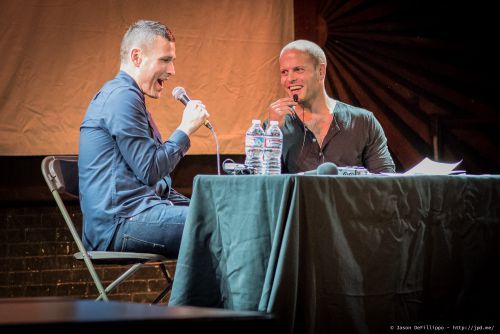
Photo credit: Jason DeFillippo
This episode is a special double header. It features one interview and one performance.
First up is Kaskade (@Kaskade), widely considered one of the Founding Fathers of Progressive House Music. He’s been voted “America’s Best DJ” twice by DJ Times, headlined Coachella 4 times, and been nominated for a Grammy 5 times.
If you want to hear a cool behind-the-scenes story about how he created the hit song 4 am, check out this 2-minute clip.
Next, you’ll hear Sekou Andrews (@SekouAndrews), the most impressive poetic voice I’ve ever heard. I first saw him perform at TED, where he blew my mind. Sekou is a schoolteacher turned 2x National Poetry Slam champion. He has presented privately for Barack Obama, Bono, Oprah Winfrey, Maya Angelou, as well as for many Fortune 500 companies. If you ever have the chance to hear him live or hire him, take it.
Or, just spend a minute and learn about the “soul selfie.”

Photo credit: Jason DeFillippo
Each one of these takes a few minutes to get warmed up, so be patient. There are gems in both. Among other things…
Kaskade covers his first breaks, making his own luck, formative musical influences, and we dig into his notetaking process, and the origins of one of his biggest hits.
Sekou will inspire you to be inspired by your story. Do you want to change your narrative, your internal dialogue, to be more successful? Do you need to get back on the horse, or have an effective pep talk in your back pocket?
This might be the recording you listen to over and over again. There is a lot of practical philosophy embedded in and between the lines, so listen to it all.
Listen to it on iTunes.
Stream by clicking here.
Download as an MP3 by right-clicking here and choosing “save as.”
Want to hear another podcast with a mega-successful performer? — Listen to my conversation with Jamie Foxx. In this episode, we discuss his workout routines, untold Hollywood stories, and he shares many of his best impressions. (Stream below or right-click here to download):
This podcast is brought to you by Audible. I have used Audible for years and I love audio books. I have two to recommend:
The Graveyard Book by Neil Gaiman
Vagabonding by Rolf Potts
All you need to do to get your free 30-day Audible trial is go to Audible.com/Tim. Choose one of the above books, or choose between more than 180,000 audio programs. That could be a book, a newspaper, a magazine, or even a class. It’s that easy. Go to Audible.com/Tim and get started today. Enjoy!
This podcast is also brought to you by 99Designs, the world’s largest marketplace of graphic designers. I have used them for years to create some amazing designs. When your business needs a logo, website design, business card, or anything you can imagine, check out 99Designs.
I used them to rapid prototype the cover for The 4-Hour Body, and I’ve also had them help with display advertising and illustrations. If you want a more personalized approach, I recommend their 1-on-1 service. You get original designs from designers around the world. The best part? You provide your feedback, and then you end up with a product that you’re happy with or your money back. Click this link and get a free $99 upgrade. Give it a test run.
QUESTION(S) OF THE DAY: What are your thoughts on my first live episode of the podcast? Would you like me to do more of these? Please let me know in the comments.
Scroll below for links and show notes…
Selected Links from the Episode
Om Records in San Francisco
Club Manhattan in Salt Lake City (closed)
Soulstice
The Cure
King King in Los Angeles
Kaskade – 4 AM
Kaskade Radio on Spotify
Daft Punk – Homework
Daft Punk – Discovery
Kraftwerk
Lights Out: A Cyberattack, A Nation Unprepared, Surviving the Aftermath by Ted Koppel
Coachella
Electric Zoo in New York
Kaskade Redux EP
Connect with Kaskade:
Connect with Sekou Andrews:
Show Notes
Kaskade on his first big break [05:52]
When Kaskade realized he could make a living from music [06:55]
Kaskade describes what it was like to move from a thriving music scene in Chicago to Utah. [08:26]
How Kaskade started making his own music [09:47]
Recommendations for someone getting started in dance music today [12:09]
Kaskade’s songwriting influences [16:40]
What rituals or self-care Kaskade uses to keep from getting run down on long tours [18:12]
Kaskade’s parenting style. [19:52]
Kaskade’s on taking notes. (And how they got him in trouble on tour.) [21:32]
Kaskade tells a behind-the-scenes story of his song 4 AM. [23:51]
Kaskade’s recommendations for a new listener to dance music. [26:17]
Kaskade talks about how most music — even rock n’ roll — is electronic these days. [27:42]
Most gifted books [28:43]
What Kaskade believes is the most underappreciated festival. [29:22]
The first person who comes to mind when Kaskade thinks of the word “successful.” [30:11]
What Kaskade’s billboard would say (and where it would be). [30:42]
Sekou Andrews shows how to take a “soul selfie.” [32:22]
Do you live what you love and love incorrigibly? Do you sleep well, but go to bed horribly? [36:05]
Sekou talks about the science of miracles and the mathematics of purpose. [37:35]
“I am not perfect. I’m perfect like I am.” [38:01]
Sekou on celebration. [38:41]
Sekou’s perfect day. [39:36]
How Sekou stays positive in the face of adversity. [41:00]
Sekou’s most powerful lessons. [41:29]
Sekou on paper-cutting despair “one positive affirmation at a time.” [44:12]
Where Sekou finds his inspiration. [46:18]
People Mentioned
Sting
Morrissey
Robert Smith
Naomi Raddon (Kaskade’s wife)

February 18, 2016
Shaun White and the Magic of “Who Cares?”
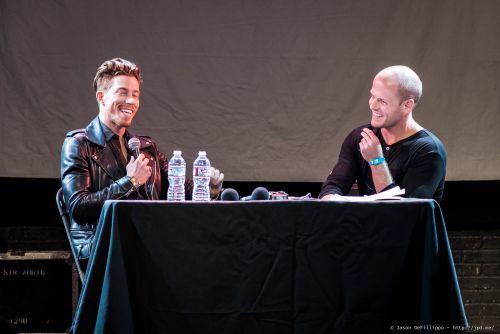
Photo: Jason DeFillippo
“My parents never really told me I couldn’t do anything.” – Shaun White
This particular episode comes from a fun event — my first live podcast at the iconic Troubadour in L.A. It sold out through my newsletter in 30 minutes, so thanks to all of you who came. If you haven’t signed up for the email newsletter, you should check it out. It’s free. Just go to fourhourworkweek.com/friday.
There were quite a few amazing guests at the event, and we’re going to divide them up into a few episodes.
Shaun White (@ShaunWhite) is our first — a professional snowboarder and skateboarder. Among his formidable feats of strength:
He’s a 2x Olympic Gold medalist.
He holds the X Games record for gold medals at 15, as well as the highest overall medal count at 24.
Shaun has earned the number two spot on BusinessWeek’s list of the 100 most powerful and marketable athletes.
And — ACH-TUNG! — for those near L.A. or willing to travel, Shaun is hosting an incredible event called Air + Style. Think of it as X Games meets Coachella, where you can listen to world-famous bands and then see jumps off of a 16-story ramp (no joke), among other excitement. Check it out at airandstyle.com. For 20% off general or VIP admission, you can use code “TimFerriss.” I get no cut, and I’ve already bought four tickets for myself and friends. The code is only good until midnight PT on February 19th (Friday).
If you only have a couple of minutes, listen here to discover who Shaun considered one of his biggest mentors and the lessons he learned.
Enjoy!
Listen to it on iTunes.
Stream by clicking here.
Download as an MP3 by right-clicking here and choosing “save as.”
Want to hear another podcast from a world-class athlete? You will probably enjoy my podcast with Triple H. In this episode, we discuss pre-fight rituals, injury avoidance, and Floyd Mayweather, Jr. (stream below or right-click here to download):
This podcast is brought to you by 99Designs, the world’s largest marketplace of graphic designers. I have used them for years to create some amazing designs. When your business needs a logo, website design, business card, or anything you can imagine, check out 99Designs.
I used them to rapid prototype the cover for The 4-Hour Body, and I’ve also had them help with display advertising and illustrations. If you want a more personalized approach, I recommend their 1-on-1 service. You get original designs from designers around the world. The best part? You provide your feedback, and then you end up with a product that you’re happy with or your money back. Click this link and get a free $99 upgrade. Give it a test run.
This podcast is also brought to you by Wealthfront. Wealthfront is a massively disruptive (in a good way) set-it-and-forget-it investing service, led by technologists from places like Apple. It has exploded in popularity in the last two years and now has more than $2.5B under management. Why? Because you can get services previously limited to the ultra-wealthy and only pay pennies on the dollar for them, and it’s all through smarter software instead of retail locations and bloated sales teams.
Check out wealthfront.com/tim, take their risk assessment quiz, which only takes 2-5 minutes, and they’ll show you—for free–exactly the portfolio they’d put you in. If you want to just take their advice and do it yourself, you can. Well worth a few minutes to explore: wealthfront.com/tim.
QUESTION(S) OF THE DAY: Based on Shaun’s two-goal philosophy, what two goals would you set for yourself? How would they help with your life or business? Please let me know in the comments.
Scroll below for links and show notes…
Selected Links from the Episode
Tetralogy of Fallot (Shaun’s heart condition)
Encinitas YMCA
Birdhouse Skateboards
X Games
charity: water
Burton Snowboards
Shaun White’s Business Is Red Hot at Fast Company
IMG
2006 Winter Olympics (Torino, Italy)
Sandman by Neil Gaiman
Open: An Autobiography by Andre Agassi
Toyota Big Air
2010 Winter Olympics (Vancouver, Canada)
Rolling Stone Magazine (March 18th, 2010) Featuring Shaun White
Fifty Shades of Chicken: A Parody in a Cookbook by F.L. Fowler
Outliers: The Story of Success by Malcolm Gladwell
Bear Mountain’s Snow Summit
AC/DC – Back in Black
Led Zeppelin – Communication Breakdown
The Black Keys – Howlin’ For You
Ozzfest
The Most Unholy Jacket Ever
Metallica – Master of Puppets
Bad Things (Shaun’s band)
Lollapalooza
Thirty Seconds to Mars
Phantogram
Air + Style
Coachella
Mayor B’s Instagram (Shaun’s dog)
Connect with Shaun White:
Air + Style | GO90 | Website | Twitter | Instagram
Show Notes
Shaun’s heart defect that made the life of a world-class athlete unlikely. [06:27]
Shaun talks about the first time he met Tony Hawk. [08:09]
Shaun discusses his family background. [14:59]
How did Shaun’s parents keep him grounded when he started getting attention from sponsors like Burton at age seven? [16:26]
How has Shaun managed to maintain creative control and avoid the pitfall of bad decisions that often plague athletes? [18:47]
Shaun talks about some of his career mentors. [21:28]
What opportunities is Shaun glad he said no to? [23:45]
What advice would current-day Shaun give to his 2006 Winter Olympics self in Torino (when he won his first gold medal)? [26:54]
Shaun describes picture day at school with two black eyes. [27:58]
Shaun explains his lifelong admiration for Andre Agassi and lessons he’s learned from the tennis great. [33:07]
Shaun sets two goals every season: something serious and something funny. [40:29]
What is Shaun’s internal dialogue when he’s competing? [44:07]
Most gifted books. [47:24]
Was growing up in Southern California a disadvantage for an aspiring snowboarder? [48:41]
Shaun tells us how his physical training differs now from when he was younger. [50:39]
Shaun’s superstitions and what he does before competitions. [55:30]
What was so unholy about Burton’s White Collection? [58:52]
How did Shaun get involved with music? [01:01:51]
Shaun tells us about inheriting the Air + Style event. [01:10:15]
Who is the first person who comes to mind when Shaun thinks of the word “successful?” [01:14:40]
Who does Shaun rely on to tell him when he’s wrong? [01:15:28]
When does Shaun tend to come up with new tricks? [01:16:39]
Are there any historical figures Shaun wishes he could meet? [01:17:25]
What would be on Shaun’s non-advertisement billboard? [01:17:41]
People Mentioned
Tony Hawk
Mike McGill
Yoda
David Blaine
Mark Ervin
Cathy White (Shaun’s mom)
Roger White (Shaun’s dad)
Jesse White (Shaun’s brother)
Bob Burnquist
Neil Gaiman
Andre Agassi
Steffi Graf
Paul Levesque (aka Triple H)
Floyd Mayweather
Seven Days in Hell
Andy Samberg
Kit Harington
Bjorn Borg
John McEnroe
Jake Burton
Jared Leto
Ozzy Osbourne
Kendrick Lamar
Donald Duck

Shaun White: The Most Unholy Snowboarder Ever

Photo: Jason DeFillippo
“My parents never really told me I couldn’t do anything.” – Shaun White
This particular episode comes from a fun event — my first live podcast at the iconic Troubadour in L.A. It sold out through my newsletter in 30 minutes, so thanks to all of you who came. If you haven’t signed up for the email newsletter, you should check it out. It’s free. Just go to fourhourworkweek.com/friday.
There were quite a few amazing guests at the event, and we’re going to divide them up into a few episodes.
Shaun White (@ShaunWhite) is our first — a professional snowboarder and skateboarder. Among his formidable feats of strength:
He’s a 2x Olympic Gold medalist.
He holds the X Games record for gold medals at 15, as well as the highest overall medal count at 24.
Shaun has earned the number two spot on BusinessWeek’s list of the 100 most powerful and marketable athletes.
And — ACH-TUNG! — for those near L.A. or willing to travel, Shaun is hosting an incredible event called Air + Style. Think of it as X Games meets Coachella, where you can listen to world-famous bands and then see jumps off of a 16-story ramp (no joke), among other excitement. Check it out at airandstyle.com. For 20% off general or VIP admission, you can use code “TimFerriss.” I get no cut, and I’ve already bought four tickets for myself and friends. The code is only good until midnight PT on February 19th (Friday).
If you only have a couple of minutes, listen here to discover who Shaun considered one of his biggest mentors and the lessons he learned.
Enjoy!
Listen to it on iTunes.
Stream by clicking here.
Download as an MP3 by right-clicking here and choosing “save as.”
Want to hear another podcast from a world-class athlete? You will probably enjoy my podcast with Triple H. In this episode, we discuss pre-fight rituals, injury avoidance, and Floyd Mayweather, Jr. (stream below or right-click here to download):
This podcast is brought to you by 99Designs, the world’s largest marketplace of graphic designers. I have used them for years to create some amazing designs. When your business needs a logo, website design, business card, or anything you can imagine, check out 99Designs.
I used them to rapid prototype the cover for The 4-Hour Body, and I’ve also had them help with display advertising and illustrations. If you want a more personalized approach, I recommend their 1-on-1 service. You get original designs from designers around the world. The best part? You provide your feedback, and then you end up with a product that you’re happy with or your money back. Click this link and get a free $99 upgrade. Give it a test run.
This podcast is also brought to you by Wealthfront. Wealthfront is a massively disruptive (in a good way) set-it-and-forget-it investing service, led by technologists from places like Apple. It has exploded in popularity in the last two years and now has more than $2.5B under management. Why? Because you can get services previously limited to the ultra-wealthy and only pay pennies on the dollar for them, and it’s all through smarter software instead of retail locations and bloated sales teams.
Check out wealthfront.com/tim, take their risk assessment quiz, which only takes 2-5 minutes, and they’ll show you—for free–exactly the portfolio they’d put you in. If you want to just take their advice and do it yourself, you can. Well worth a few minutes to explore: wealthfront.com/tim.
QUESTION(S) OF THE DAY: Based on Shaun’s two-goal philosophy, what two goals would you set for yourself? How would they help with your life or business? Please let me know in the comments.
Scroll below for links and show notes…
Selected Links from the Episode
Tetralogy of Fallot (Shaun’s heart condition)
Encinitas YMCA
Birdhouse Skateboards
X Games
charity: water
Burton Snowboards
Shaun White’s Business Is Red Hot at Fast Company
IMG
2006 Winter Olympics (Torino, Italy)
Sandman by Neil Gaiman
Open: An Autobiography by Andre Agassi
Toyota Big Air
2010 Winter Olympics (Vancouver, Canada)
Rolling Stone Magazine (March 18th, 2010) Featuring Shaun White
Fifty Shades of Chicken: A Parody in a Cookbook by F.L. Fowler
Outliers: The Story of Success by Malcolm Gladwell
Bear Mountain’s Snow Summit
AC/DC – Back in Black
Led Zeppelin – Communication Breakdown
The Black Keys – Howlin’ For You
Ozzfest
The Most Unholy Jacket Ever
Metallica – Master of Puppets
Bad Things (Shaun’s band)
Lollapalooza
Thirty Seconds to Mars
Phantogram
Air + Style
Coachella
Mayor B’s Instagram (Shaun’s dog)
Connect with Shaun White:
Air + Style | GO90 | Website | Twitter | Instagram
Show Notes
Shaun’s heart defect that made the life of a world-class athlete unlikely. [06:27]
Shaun talks about the first time he met Tony Hawk. [08:09]
Shaun discusses his family background. [14:59]
How did Shaun’s parents keep him grounded when he started getting attention from sponsors like Burton at age seven? [16:26]
How has Shaun managed to maintain creative control and avoid the pitfall of bad decisions that often plague athletes? [18:47]
Shaun talks about some of his career mentors. [21:28]
What opportunities is Shaun glad he said no to? [23:45]
What advice would current-day Shaun give to his 2006 Winter Olympics self in Torino (when he won his first gold medal)? [26:54]
Shaun describes picture day at school with two black eyes. [27:58]
Shaun explains his lifelong admiration for Andre Agassi and lessons he’s learned from the tennis great. [33:07]
Shaun sets two goals every season: something serious and something funny. [40:29]
What is Shaun’s internal dialogue when he’s competing? [44:07]
Most gifted books. [47:24]
Was growing up in Southern California a disadvantage for an aspiring snowboarder? [48:41]
Shaun tells us how his physical training differs now from when he was younger. [50:39]
Shaun’s superstitions and what he does before competitions. [55:30]
What was so unholy about Burton’s White Collection? [58:52]
How did Shaun get involved with music? [01:01:51]
Shaun tells us about inheriting the Air + Style event. [01:10:15]
Who is the first person who comes to mind when Shaun thinks of the word “successful?” [01:14:40]
Who does Shaun rely on to tell him when he’s wrong? [01:15:28]
When does Shaun tend to come up with new tricks? [01:16:39]
Are there any historical figures Shaun wishes he could meet? [01:17:25]
What would be on Shaun’s non-advertisement billboard? [01:17:41]
People Mentioned
Tony Hawk
Mike McGill
Yoda
David Blaine
Mark Ervin
Cathy White (Shaun’s mom)
Roger White (Shaun’s dad)
Jesse White (Shaun’s brother)
Bob Burnquist
Neil Gaiman
Andre Agassi
Steffi Graf
Paul Levesque (aka Triple H)
Floyd Mayweather
Seven Days in Hell
Andy Samberg
Kit Harington
Bjorn Borg
John McEnroe
Jake Burton
Jared Leto
Ozzy Osbourne
Kendrick Lamar
Donald Duck

February 16, 2016
Meet “Scorpion,” The Real-Life Santa Claus

“I believe that peace means that one person has the biggest stick. I build those sticks.” – Walter O’Brien
UPDATE: This episode ended up sparking a lot of controversy. Many skeptics asked pointed questions about Walter’s background, claims, and credentials (often pointing to pages like this or this). This is the first time I’ve run into such an issue with the podcast, so it took me some time to figure out how to respond.
Here is my post-game analysis, as well as Walter’s response.
I struggled with whether or not to take down this episode and blog post entirely. In the end, I decided it was more instructive to leave the below original up (with this new preface) and add an audio note to the beginning of the podcast (coming soon).
I’m hoping it will help us all improve, especially yours truly. Thank you for all of your feedback.
Walter O’Brien (AKA “Scorpion”) (@walterobrienscs) is the founder of Scorpion Computer Services and ConciergeUp.com, a for-hire global think tank that provides intelligence-on-demand as a concierge service. The tag line for the latter is, “for any funded need.”
Need to defend against chemical warfare?
Move an entire manufacturing operation over a weekend?
Save a loved one from a deceitful spouse?
Thread the needle on a thorny legal issue?
Become a pop star in a foreign country?
When Walter and his team of 2,000+ distributed geniuses say “any funded need,” they mean it literally.
Born in Ireland, Walter was diagnosed as a child prodigy with an IQ of 197. He became an Irish national coding champion and competed in the Olympics in informatics.
Fast forward to today, he and Scorpion get paid to fix every imaginable problem for billionaires, startups, governments, Fortune 500 companies, and people like you and me. On the large side, it ranges from mitigating risk on $1.9 trillion of investments to inventing artificial intelligence engines to protect United States war fighters in Afghanistan.
Walter is also the executive producer of the hit CBS TV show Scorpion, inspired by his life, which has reached more than 26 million television viewers.
I was introduced to Walter well before the show, and we go deep in this conversation, with lots of amazing and also hilarious examples of problem solving.
Enjoy!
Listen to it on iTunes.
Stream by clicking here.
Download as an MP3 by right-clicking here and choosing “save as.”
Want to hear another podcast from a world-class computer scientist? — Listen to my conversation with Luis von Ahn, the founder and CEO of DuoLingo. In this episode, we discuss learning languages, building companies, and changing the world (stream below or right-click here to download):
This podcast is brought to you by Wealthfront. Wealthfront is a massively disruptive (in a good way) set-it-and-forget-it investing service, led by technologists from places like Apple. It has exploded in popularity in the last two years and now has more than $2.5B under management. Why? Because you can get services previously limited to the ultra-wealthy and only pay pennies on the dollar for them, and it’s all through smarter software instead of retail locations and bloated sales teams.
Check out wealthfront.com/tim, take their risk assessment quiz, which only takes 2-5 minutes, and they’ll show you—for free–exactly the portfolio they’d put you in. If you want to just take their advice and do it yourself, you can. Well worth a few minutes to explore: wealthfront.com/tim.
This podcast is also brought to you by Boll & Branch. There is a lot of nonsense in the bedding business. For instance, did you know thread-count is not a good measurement of quality? It’s a total myth. The “Made in Italy” label? It isn’t something you should necessarily pay extra for because it generally means it’s just finished in Italy and woven in places like China.
The general industry mark-up for bedding is 700 to 800 percent at most retailers. Boll & Branch creates incredibly high-quality bedding. They are the same sheets you’ll find at my home in San Francisco.
The best part? You can try anything you order at home for 30 days. If you don’t love it, send it back and get a full refund. Go to Boll & Branch and use promo code “TIM” for 20% off your entire order. Whether sheets, towels, blankets, duvet covers, or anything else. Shipping is always free.
QUESTION(S) OF THE DAY: What is a problem you would like to have ConciergeUp solve for you? Please let me know in the comments.
Scroll below for links and show notes…
Selected Links from the Episode
Learn more about ConciergeUp
Learn more about the Aegis Ballistic Missile Defense System
Fooled by Randomness by Nassim Nicholas Taleb
Bad Science by Ben Goldacre
Learn more about HTC VIVE
The Diamond Age by Neal Stephenson
Snow Crash by Neal Stephenson and Jonathan Davis
Glimpses of Heaven, Visions of Hell by Barrie Sherman and Phillip Judkins
Learn more about Teslasuit or tactile feedback suits
Learn more about ScenGen
Watch the TV show based on Scorpion
The 48 Laws of Power by Robert Green
The Black Swan by Nassim Nicholas Taleb
Into the Heart of the Mind by Frank Rose
Show Notes
How Walter O’Brien began his relationship with NASA [8:15]
How Scorpion came to be [13:20]
The Emotional Quotient vs. Intellectual Quotient phenomenon [15:05]
The origin story of the name Scorpion and current status of the company [16:40]
The largest project Scorpion Computer Sciences has worked on [20:05]
How Scorpion implements “any funded need” solutions [20:42]
The “Gold Digger” story [23:07]
The current state of head transplants and why it may be of interest [30:00]
Why Walter O’Brien has never tried alcohol [38:28]
How Walter O’Brien cultivated a higher EQ [43:25]
Thoughts on developing the skill of rational thinking [45:30]
Meditative practices [53:10]
On virtual reality [57:15]
What is ScenGen? [1:04:20]
Are high IQ intellectuals more susceptible to emotional highs and lows? [1:12:47]
Cognitive patterns in people with high IQ [1:14:54]
How the TV show Scorpion came to be [1:16:45]
When you think of the word successful who is the first person who comes to mind and why? [1:30:22]
How Walter O’Brien gets out of a funk [1:32:09]
Most gifted books [1:33:20]
What purchase of $100 or less has most positively affected your life? [1:34:40]
Advice to Walter O’Brien’s 30-year-old-self [1:37:45]
On the challenge of sleeping [1:39:35]
Particular morning routines [1:41:35]
Thoughts on New Year’s resolutions, goal setting and completing the to-do list [1:42:30]
Historical figures that Walter O’Brien identifies with the most [1:43:50]
If you could put one billboard anywhere, with anything on it, where would it be and what would it say? [1:45:00]
Final words and asks of the audience [1:48:10]
People Mentioned
Scooter Braun
Bill Gates
Winston Churchill
Meet “Scorpion,” The Real-Life Santa Claus with an IQ of 197

“I believe that peace means that one person has the biggest stick. I build those sticks.” – Walter O’Brien
This episode might make your head explode… in the best way possible.
Walter O’Brien (AKA “Scorpion”) (@walterobrienscs) is the founder of Scorpion Computer Services and ConciergeUp.com, a for-hire global think tank that provides intelligence-on-demand as a concierge service. The tag line for the latter is, “for any funded need.”
Need to defend against chemical warfare?
Move an entire manufacturing operation over a weekend?
Save a loved one from a deceitful spouse?
Thread the needle on a thorny legal issue?
Become a pop star in a foreign country?
When Walter and his team of 2,000+ distributed geniuses say “any funded need,” they mean it literally.
Born in Ireland, Walter was diagnosed as a child prodigy with an IQ of 197. He became an Irish national coding champion and competed in the Olympics in informatics.
Fast forward to today, he and Scorpion get paid to fix every imaginable problem for billionaires, startups, governments, Fortune 500 companies, and people like you and me. On the large side, it ranges from mitigating risk on $1.9 trillion of investments to inventing artificial intelligence engines to protect United States war fighters in Afghanistan.
Walter is also the executive producer of the hit CBS TV show Scorpion, inspired by his life, which has reached more than 26 million television viewers.
I was introduced to Walter well before the show, and we go deep in this conversation, with lots of amazing and also hilarious examples of problem solving.
If you only have a few minutes, listen to this mind-blowing segment on head transplants. (Yes, head transplants.)
Enjoy!
Listen to it on iTunes.
Stream by clicking here.
Download as an MP3 by right-clicking here and choosing “save as.”
Want to hear another podcast from a world-class computer scientist? — Listen to my conversation with Luis von Ahn, the founder and CEO of DuoLingo. In this episode, we discuss learning languages, building companies, and changing the world (stream below or right-click here to download):
This podcast is brought to you by Wealthfront. Wealthfront is a massively disruptive (in a good way) set-it-and-forget-it investing service, led by technologists from places like Apple. It has exploded in popularity in the last two years and now has more than $2.5B under management. Why? Because you can get services previously limited to the ultra-wealthy and only pay pennies on the dollar for them, and it’s all through smarter software instead of retail locations and bloated sales teams.
Check out wealthfront.com/tim, take their risk assessment quiz, which only takes 2-5 minutes, and they’ll show you—for free–exactly the portfolio they’d put you in. If you want to just take their advice and do it yourself, you can. Well worth a few minutes to explore: wealthfront.com/tim.
This podcast is also brought to you by Boll & Branch. There is a lot of nonsense in the bedding business. For instance, did you know thread-count is not a good measurement of quality? It’s a total myth. The “Made in Italy” label? It isn’t something you should necessarily pay extra for because it generally means it’s just finished in Italy and woven in places like China.
The general industry mark-up for bedding is 700 to 800 percent at most retailers. Boll & Branch creates incredibly high-quality bedding. They are the same sheets you’ll find at my home in San Francisco.
The best part? You can try anything you order at home for 30 days. If you don’t love it, send it back and get a full refund. Go to Boll & Branch and use promo code “TIM” for 20% off your entire order. Whether sheets, towels, blankets, duvet covers, or anything else. Shipping is always free.
QUESTION(S) OF THE DAY: What is a problem you would like to have ConciergeUp solve for you? Please let me know in the comments.
Scroll below for links and show notes…
Selected Links from the Episode
Learn more about ConciergeUp
Learn more about the Aegis Ballistic Missile Defense System
Fooled by Randomness by Nassim Nicholas Taleb
Bad Science by Ben Goldacre
Learn more about HTC VIVE
The Diamond Age by Neal Stephenson
Snow Crash by Neal Stephenson and Jonathan Davis
Glimpses of Heaven, Visions of Hell by Barrie Sherman and Phillip Judkins
Learn more about Teslasuit or tactile feedback suits
Learn more about ScenGen
Watch the TV show based on Scorpion
The 48 Laws of Power by Robert Green
The Black Swan by Nassim Nicholas Taleb
Into the Heart of the Mind by Frank Rose
Show Notes
How Walter O’Brien began his relationship with NASA [8:15]
How Scorpion came to be [13:20]
The Emotional Quotient vs. Intellectual Quotient phenomenon [15:05]
The origin story of the name Scorpion and current status of the company [16:40]
The largest project Scorpion Computer Sciences has worked on [20:05]
How Scorpion implements “any funded need” solutions [20:42]
The “Gold Digger” story [23:07]
The current state of head transplants and why it may be of interest [30:00]
Why Walter O’Brien has never tried alcohol [38:28]
How Walter O’Brien cultivated a higher EQ [43:25]
Thoughts on developing the skill of rational thinking [45:30]
Meditative practices [53:10]
On virtual reality [57:15]
What is ScenGen? [1:04:20]
Are high IQ intellectuals more susceptible to emotional highs and lows? [1:12:47]
Cognitive patterns in people with high IQ [1:14:54]
How the TV show Scorpion came to be [1:16:45]
When you think of the word successful who is the first person who comes to mind and why? [1:30:22]
How Walter O’Brien gets out of a funk [1:32:09]
Most gifted books [1:33:20]
What purchase of $100 or less has most positively affected your life? [1:34:40]
Advice to Walter O’Brien’s 30-year-old-self [1:37:45]
On the challenge of sleeping [1:39:35]
Particular morning routines [1:41:35]
Thoughts on New Year’s resolutions, goal setting and completing the to-do list [1:42:30]
Historical figures that Walter O’Brien identifies with the most [1:43:50]
If you could put one billboard anywhere, with anything on it, where would it be and what would it say? [1:45:00]
Final words and asks of the audience [1:48:10]
People Mentioned
Scooter Braun
Bill Gates
Winston Churchill






